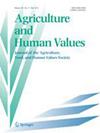“A farm is viable if it can keep its head above water”: defining and measuring farm viability for small and mid-sized farms
Abstract
The way farm viability is defined and conceptualized has become increasingly incongruent with the way that small-scale farmers make a living, as their livelihood strategies have evolved and changed in response to broad structural changes over the past several decades. Farm viability is typically defined as meeting the income needs of the farm family as well as supporting the farm’s operating costs. However, our study shows that New England farmers define farm viability as their ability to stay in business and to keep the land in agriculture. In this paper, we bring together the agricultural economics and rural sociological research literature on farm viability and persistence as well as food justice scholarship to advance the development of a more relevant and integrated approach to evaluating the viability of small and mid-sized farms. We present farmers’ own conceptions of farm viability, drawn from 37 interviews with the operators of small farms in New England. While most of the farmers we interviewed conceptualize farm viability as their ability to stay in business, many of them shared broader views of farm viability that integrated the social and environmental sustainability of their enterprises in the face of financial pressures and increased weather extremes from climate change. These were described as their ability to continue farming year after year and keep their land in agriculture, and their ability to maintain their own health and wellbeing as integral to a viable farm enterprise. Farmers emphasized their (in)ability to continue farming from a social sustainability standpoint as directly impacting the viability of their farms. We argue for a shift away from narrow measures of farm viability that are solely based on farm owners’ household income to a broader, multidimensional approach to defining and measuring farm viability that could enable analyses that are relevant to critical sustainability concerns for US agriculture.

 求助内容:
求助内容: 应助结果提醒方式:
应助结果提醒方式:


